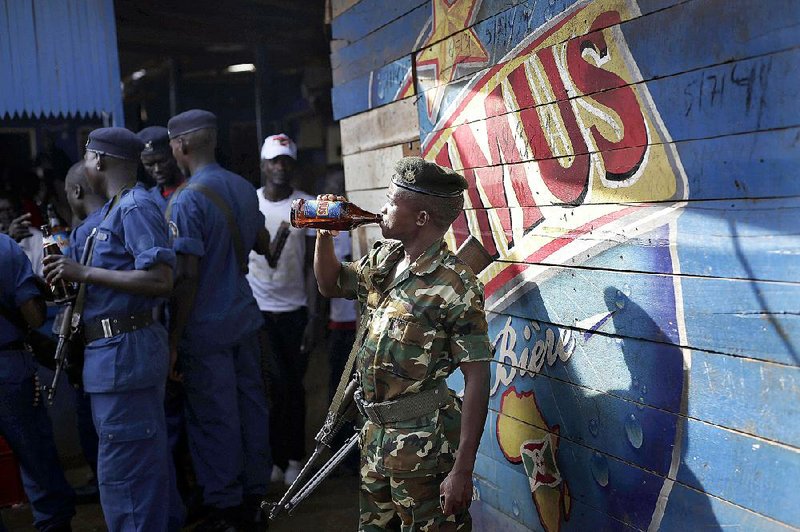BUJUMBURA, Burundi -- President Pierre Nkurunziza thanked his security forces Friday for crushing a military coup that sought to topple him, and he urged an immediate halt to the protests held in recent weeks since he decided to seek a third term.
Nkurunziza's motorcade rolled into the capital earlier in the day and he returned to the presidential palace, said his spokesman, Gervais Abayeho. The president did not appear in public.
His supporters cheered his return and the failure of the coup. Maj. Gen. Godefroid Niyombare, a former intelligence chief, had announced Wednesday while Nkurunziza was in Tanzania that he had relieved the president of his duties.
That triggered fierce fighting in the capital between Niyombare's forces and those loyal to Nkurunziza. The city was calm but tense Friday, with many businesses closed. Some residents who don't support the government emerged from their homes to resume protests.
Three army generals accused of trying to topple Nkurunziza were arrested when they were found hiding in a house, while another senior security official was caught at the border trying to flee to Tanzania, Abayeho said. He added that Niyombare remained at large and a manhunt was underway.
In his speech, which was posted on his website in Burundi's official language of Kirundi, Nkurunziza thanked "the security and defense forces for the efficiency with which they fought the coup against the democratically elected institutions."
He said "peace reigns throughout the country, even in Bujumbura where this small group of criminals wanted to commit the irreparable," a reference to the coup plotters, and he added that they had been preparing their actions "for a long time, since last year and before."
Nkurunziza called for an immediate end to all hostilities and urged dialogue.
"We therefore urge the immediate cessation of the demonstrations, that those who have claims do so in dialogue and consultation, not through force and revolt," he said.
The protests began April 26, a day after the ruling party made Nkurunziza its presidential candidate, and at least 15 people have been killed in the unrest.
Opponents said his plan violated the constitution as well as peace accords that ended a civil war. The constitution states that a president can be popularly elected to two five-year terms, but Nkurunziza maintains that he can run for a third term because parliament voted him into office the first time, leaving him eligible to be popularly elected to two terms.
More than 105,000 Burundians have fled to neighboring countries recently, according to the U.N., and U.N. High Commissioner for Refugees Zeid Ra'ad Al Hussein warned Friday that the country is at risk of descending further into chaos.
He urged authorities to ensure that the instigators of the failed coup are not harmed and that there are no reprisals against their perceived supporters, journalists, human-rights activists and the many civilian protesters.
At the United Nations, Secretary-General Ban Ki-moon spoke to Kenyan President Uhuru Kenyatta about Burundi and emphasized the need for regional leaders "to join efforts to help resolve the crisis," said deputy spokesman Farhan Haq. Ban plans to talk to Nkurunziza and other regional leaders in the coming days, he added.
U.S. State Department spokesman Jeff Rathke said Washington was concerned by incidents of retaliatory violence and warned that those who plan, participate in or order such acts would be held accountable.
Rathke repeated U.S. opposition to Nkurunziza seeking a third term, saying his candidacy alone is exacerbating instability and fomenting violence.
Meanwhile, journalists in Burundi who spoke out against human-rights abuses by the police, intelligence services and the ruling party's youth militia during recent protests may be targeted in reprisal attacks, Human Rights Watch said.
The East African nation's four most popular media outlets, Radio Publique Africaine, Radio Bonesha FM, Radio Isanganiro and Radio Television Renaissance, have already been attacked and are unable to broadcast, the New York-based advocacy group said by email Friday. Iwacu, the country's main independent newspaper, suspended publication after being warned that it may be targeted, it said.
"Burundian journalists told Human Rights Watch they fear reprisals, since many are viewed by the president's allies as sympathetic to the opposition," Carina Tertsakian, a researcher at Human Rights Watch, said in the statement.
The government-owned Radio Television Nationale du Burundi is among the only broadcasters still on the air though it has mostly been playing music, Tertsakian said.
Information for this article was contributed by Tom Odula, Gerard Nzohabona, Jerome Delay, Edmund Kagire, Bradley Klapper and Edith M. Lederer of The Associated Press; and by Paul Richardson of Bloomberg News.
A Section on 05/16/2015
